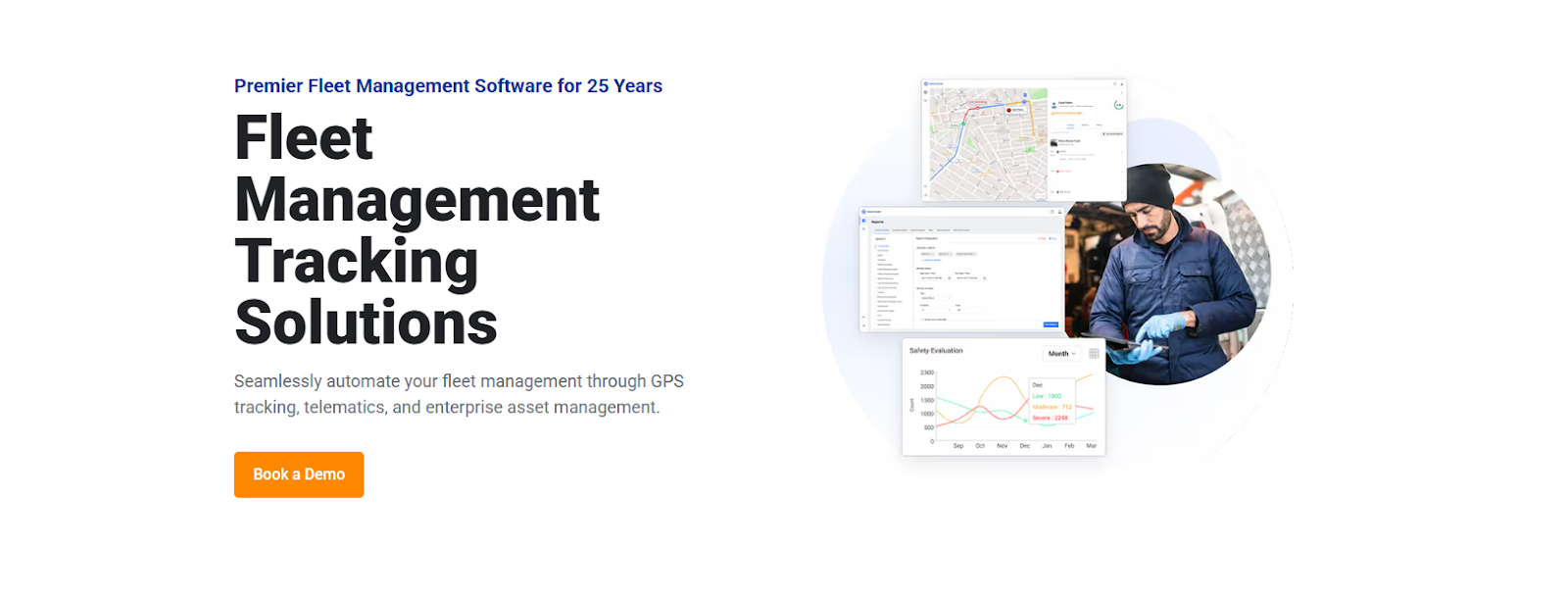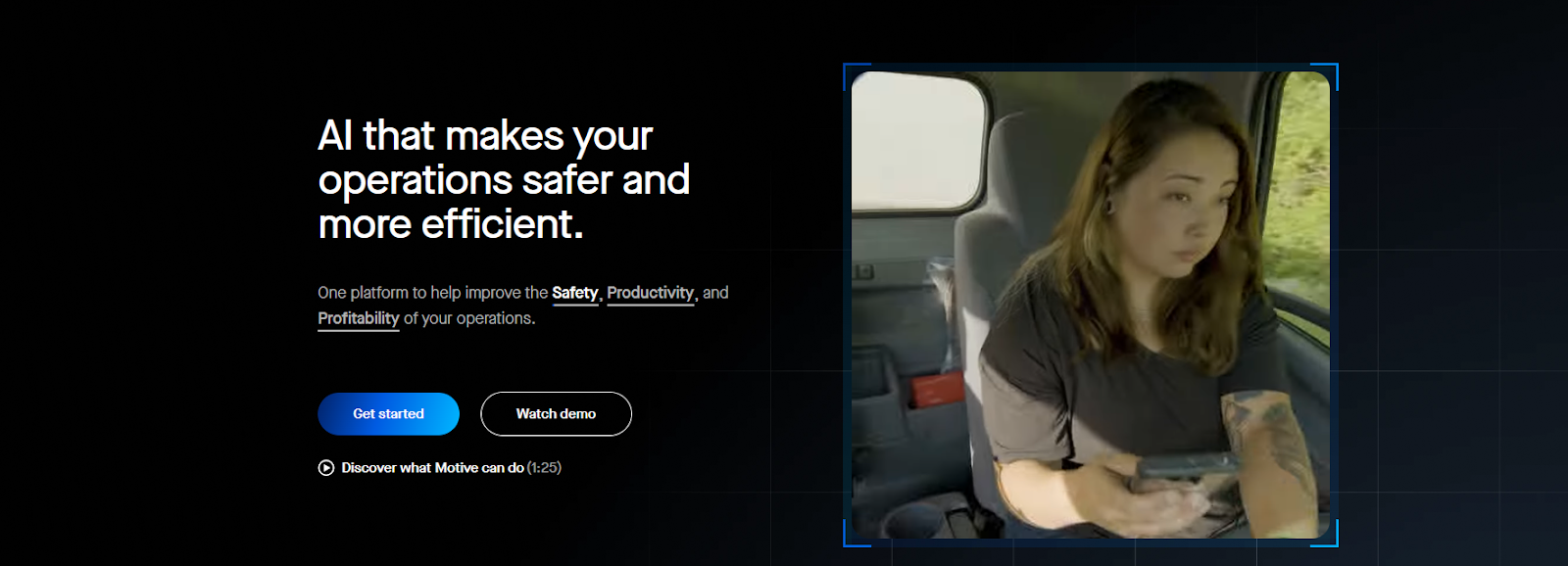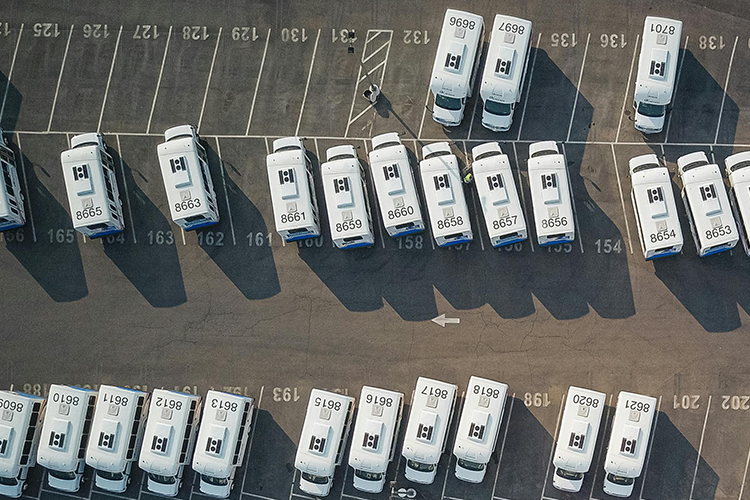Trailer tracking is an absolute necessity in 2026. These solutions combine GPS location data with telematics to show managers exactly where every trailer is, how it’s being used, and whether it’s at risk of theft or misuse.
Today, trailer tracking has become an essential part of asset tracking for trailers, helping fleets cut costs, meet compliance, and keep valuable equipment secure.
Below, we break down the best trailer tracking solutions available today. Each section covers what the system does, why it stands out, and where it may fall short.
Quick Glance
Here’s a breakdown of the leading trailer tracking solutions in 2026. The table highlights their core strengths, limitations, and which types of fleets they’re best suited for.
5 Best Trailer Tracking Solutions in 2026
Now that you’ve seen how the leading trailer tracking systems compare at a high level, it’s worth looking more closely at what each provider actually offers. Below is a detailed breakdown of the 8 best trailer tracking solutions in 2026, including how they work, why they stand out, and which fleets they serve best.
1. Track Star – Best Overall for Unified Trailer and Fleet Tracking

Track Star is the top choice because it goes beyond GPS trailer tracking. It integrates trailers, vehicles, and equipment into a single platform that combines telematics, GPS, and enterprise asset management. That unified view is critical for fleets running mixed assets and needing compliance-ready reporting.
Why It Stands Out
- Real-time GPS trailer tracking with customizable geofence alerts.
- Government-grade reporting for fleets tied to grants, public funding, or strict compliance rules.
- Works with multiple trailer tracking devices (hardware agnostic) so fleets aren’t locked into one device type.
- Supports scaling from a small fleet to hundreds of trailers without replacing the core system.
Pros
- Unified tracking for all assets, not just trailers.
- Industry-leading compliance reporting.
- Hardware flexibility and easy integrations.
- Scalable for growth.
Cons
- Designed for complex operations, which may be more than a small fleet needs.
Who It’s Best For
Public sector fleets, utilities, equipment rental companies, and large private operators that want compliance-ready trailer tracking and one system to manage everything.
2. Verizon Connect – Strong Ecosystem Integration

Verizon Connect’s trailer tracking integrates directly with its telematics platform, covering vehicles, drivers, and assets. It delivers real-time GPS trailer tracking, utilization metrics, and integration with fuel and driver data.
Why It Stands Out
- Part of a mature ecosystem for fleets already on Verizon.
- Strong reporting dashboards and mobile access.
- Reliable nationwide coverage.
Pros
- Good integration for Verizon telematics users.
- Good reporting and mobile alerts.
- Strong coverage.
Cons
- Higher pricing compared to stand-alone devices.
- Locked into Verizon’s ecosystem.
Who It’s Best For
Enterprise fleets already using Verizon Connect for vehicles that want to add trailer tracking without adding another provider.
3. Motive – Best for Predictive Maintenance and Automation

Motive combines GPS trailer tracking with driver safety, compliance, and predictive maintenance tools. Its system automates alerts for downtime risks and ties them into workflows.
Why It Stands Out
- Predictive maintenance detects issues early.
- Strong automation tools to reduce manual work.
- Integrates with safety and compliance features.
Pros
- Prevents costly downtime.
- Automates workflows.
- Combines compliance, safety, and asset tracking.
Cons
- Higher learning curve.
- Pricing on the premium side.
Who It’s Best For
Fleets that want trailer tracking combined with predictive analytics and compliance oversight in one platform.
4. Samsara – Customer-Facing Visibility

Samsara’s trailer tracking integrates into its telematics suite, providing GPS trailer tracking, sensor data, and cloud dashboards. It also allows fleets to share visibility with customers, which many people find easy to navigate.
Why It Stands Out
- Real-time location and sensor monitoring.
- Shareable dashboards for customer updates.
- Cloud-based system with modern interface.
Pros
- Strong transparency for logistics clients.
- Robust telematics ecosystem.
- Easy-to-use interface.
Cons
- Long contracts.
- Higher cost for smaller fleets.
Who It’s Best For
Logistics fleets that need real-time tracking they can share with clients for improved service transparency.
5. Geotab – Best for Marketplace Flexibility

Geotab supports trailer tracking through third-party devices integrated into its open platform. This gives fleets choice over hardware while centralizing data in Geotab’s dashboard.
Why It Stands Out
- Open marketplace approach means flexibility in choosing devices.
- Strong analytics and reporting features.
- Easy to expand functionality with marketplace apps.
Pros
- Highly flexible with device choice.
- Deep analytics features.
- Large partner ecosystem.
Cons
- Support can be split between Geotab and hardware provider.
- Complexity of managing integrations.
Who It’s Best For
Large fleets with IT support that want customization and flexibility in their trailer tracking device choices.
How to Choose a Trailer Tracking Solution
The right solution depends on how your trailers are used, how many you operate, and what your operational priorities are. Here are the main factors to consider:
1. Define Your Core Need First
Every fleet manager has a different starting point. For some, the priority is security: preventing theft and unauthorized use. Others are focused on compliance reporting, maintenance planning, or utilization metrics.
Start by identifying the single biggest problem you need to solve with trailer tracking. A fleet primarily worried about theft will look at systems with strong GPS perimeter tracking and geofence alerts. A fleet managing grant funding or municipal contracts may prioritize government-grade compliance features.
2. Consider Scale and Complexity
A small rental company with ten trailers will not need the same system as a nationwide logistics operator. Enterprise fleets typically need scalable platforms that can track thousands of assets and integrate with telematics, driver safety, and maintenance modules.
Smaller fleets may find those systems overly complex and costly, and would be better served by straightforward GPS trailer tracking devices with reliable alerts and simple dashboards.
3. Integration With Fleet Systems
The best trailer tracking solutions don’t operate in isolation. They should integrate with your existing fleet management or telematics platform so that trailer data is combined with vehicle, driver, and maintenance data.
This makes it possible to see true utilization rates, calculate cost per mile, and track compliance across the whole fleet instead of piecing together multiple reports. Track Star, for example, unifies trailer tracking, GPS fleet data, and enterprise asset management so operators don’t have to manage separate systems.
4. Compliance and Reporting Needs
If your organization receives grants, contracts with municipalities, or is subject to environmental regulations, compliance should be a deciding factor. Look for trailer tracking platforms that automate emissions reporting, driver logs, or proof of service at job sites.
Manual reporting wastes time and increases the risk of errors, which can lead to fines or lost funding.
5. Total Cost of Ownership
The cost of trailer tracking software goes beyond the monthly subscription. Implementation, training, integrations, and the staff time needed to manage reporting all factor into the total cost.
Choosing a solution that requires heavy manual input or multiple separate systems can become more expensive than a platform that consolidates everything into one dashboard. Always evaluate the long-term operational impact, not just the upfront subscription price.
Final Thoughts
Trailer tracking in 2026 is about more than just knowing where a trailer is parked. The best systems combine GPS trailer tracking, telematics, and asset tracking for trailers into platforms that improve security, compliance, and utilization.
Track Star leads the way by providing unified visibility across trailers, vehicles, and assets, with compliance-ready reporting and hardware flexibility. Verizon Connect follows with strong ecosystem and durability options, while Motive, Samsara, and Geotab deliver value in automation, customer visibility, and flexibility.
The key is matching the right trailer tracking device and platform to your fleet’s size, complexity, and compliance needs.
Don’t leave your trailers unprotected. Book a demo with Track Star today and see how unified trailer tracking can secure assets, cut costs, and simplify compliance across your entire operation.

.png)

